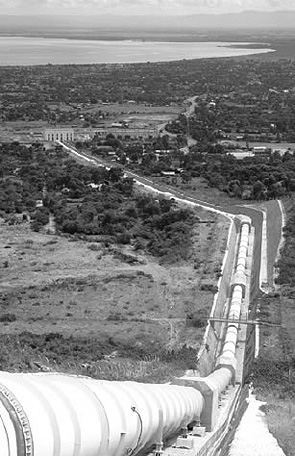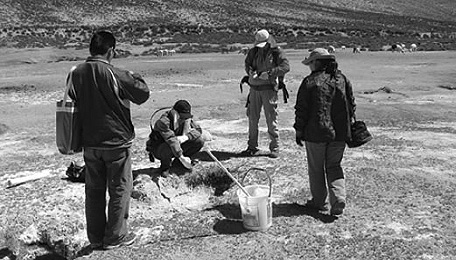Japan's Official Development Assistance White Paper 2011
(4) Resources and Energy
In developing countries, over 1.3 billion people (20% of the world’s population) have no access to electricity.(Note 15) The lack of electricity, gas, and other energy services leads to problems of delayed development of industry, the loss of employment opportunities, increase in poverty, limited access to medical services and education. It is anticipated that the world's demand for energy will increase further in the future, particularly in Asia and other emerging and developing countries, so the stable supply of energy and appropriate consideration of the environment is essential.
<Japan's Efforts>
In order to secure sustainable development and energy in developing countries, Japan works on the services of modern energy supply and the stable supply of power for industrial development. In addition, Japan provides support for the establishment of an environmentally friendly infrastructure, such as the efficiency of energy use and construction of power generation facilities that utilize renewable energy (hydropower, sunlight, wind power, geothermal power, etc.).
Japan works with resource-rich countries to enable them to acquire foreign currency through the development of their resources and to develop independently. Japan also provides aid to the resource-rich countries with establishing infrastructure in the areas around mines according to their needs. Japan will use such projects to build and strengthen overall and strategic relationships. This type of assistance leads to the smooth development of resources, production, and transportation by companies, making it possible to ensure the stable supply of energy and mineral resources. It is important to utilize ODA proactively in resource and energy area, in addition to assistance from the Japan Bank for International Cooperation (JBIC), Nippon Export and Investment Insurance (NEXI), and the Japan Oil, Gas and Metals National Corporation (JOGMEC).

A hydroelectric power plant built on the Shore of Lake Victoria in Kenya as part of the "Sondu-Miriu Hydropower Project Sang'oro Power Plant" construction project. A power generation facility is located at the end of the pipeline. (Photo: Shinichi Kuno/JICA)
Notes:
(15) Source: "World Energy Outlook 2011" International Energy Agency (estimates as of 2009)
[Peru]
"Master Plan for Development of Geothermal Energy in Peru"
Technical Cooperation for Development Planning (February 2010 - September 2011)
Peru has an abundance of geothermal resources on the region of the Andes Mountains. In recent years, the Government of Peru has advanced legal measures, such as the Law for the Promotion of Electricity Generation with Renewable Energies, and has formulated policies to encourage the use of renewable energy generation including geothermal power. On the other hand, Peru does not have experience of geothermal power generation, and lacks sufficient personnel with skills and experience. Therefore, Peru has requested Japan for cooperation, and Japan has begun working on formulation of master plan that delineates a roadmap for the development of geothermal power generation, and researches to facilitate the preparation of information on geothermal power resources. The researches included the utilization of Japan's superior technology, knowledge, and experience to conduct geological and geochemical surveys of 10 major geothermal fields, as well as investigation and evaluation of resources, investigation of laws/regulations and circumstances related to electric power, and investigation of environmental and social considerations, etc. At the same time, Japan also transfers technology to related parties in Peru through the researches. These researches are expected to contribute to elaborate measures on climate change due to the development of geothermal power generation which prevent emission of carbon dioxide while generating electric power.

A Japanese investigation team and Peruvian staff members conduct a geochemical survey (spring water temperature measurement) (Photo: JICA)
